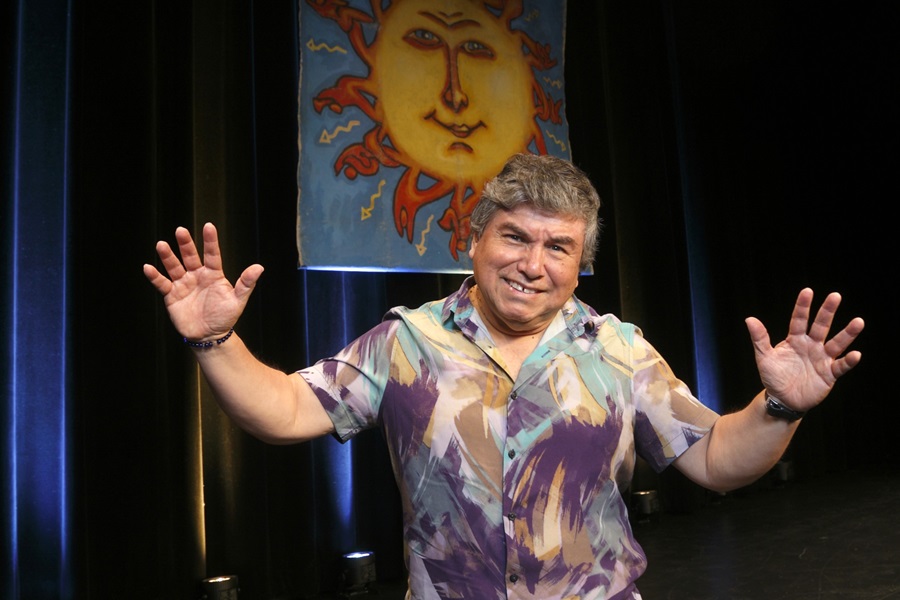Bringing the light
He came to London as a refugee. Now, almost four decades later, Sunfest founder and Order of Canada appointee Alfredo Caxaj is set to mark 30 years of bringing the world to our doorstep
Photo: Sunfest founder Alfredo Caxaj
FOR NEARLY FOUR decades, the date November 21 has been special for Alfredo Caxaj and his family. That was the date, in 1985, when they arrived in Canada, fleeing political turmoil and violence in their native Guatemala. Identified by Canadian embassy officials after family members, including two brothers, were killed, the family came to London, unprepared for the culture shock, frigid temperatures and racism.
They slowly made a life for themselves, working a variety of jobs and going from merely surviving to thriving.
Click here to view this story in magazine format
“On November 21, we always call or text each other, noting the day,” says Mercedes Caxaj, a daughter born a year after they arrived. Last year, however, was different. That morning, Alfredo got an email from an Ottawa civil servant: Could she call him later that day?
“For a moment, you wonder if there’s a problem with your taxes or something,” he laughs. It was as far from tax problems as he could imagine. The woman was calling to tell him he was being appointed to the Order of Canada, one of only 78 Canadians chosen this year.
Story Continues Below
“She had read my file. They had talked to people about me. She was so polite and encouraging. And then when I told her why November 21 was so special to me, she was almost crying.”
Thirty-eight years to the day after arriving in Canada, Alfredo Caxaj was being recognized by his adopted homeland for a lifetime of contributions to the arts and to Canadian society in general. It was a lot to take in, and he’s still a little bit overwhelmed. As news of the appointment spread, people dotting the globe shared in his joy. They are part of the tapestry of musicians, performers and festival organizers Caxaj and his family have met and worked with over the years, starting with a nascent idea they had more than three decades ago to create a concert series showcasing international music.
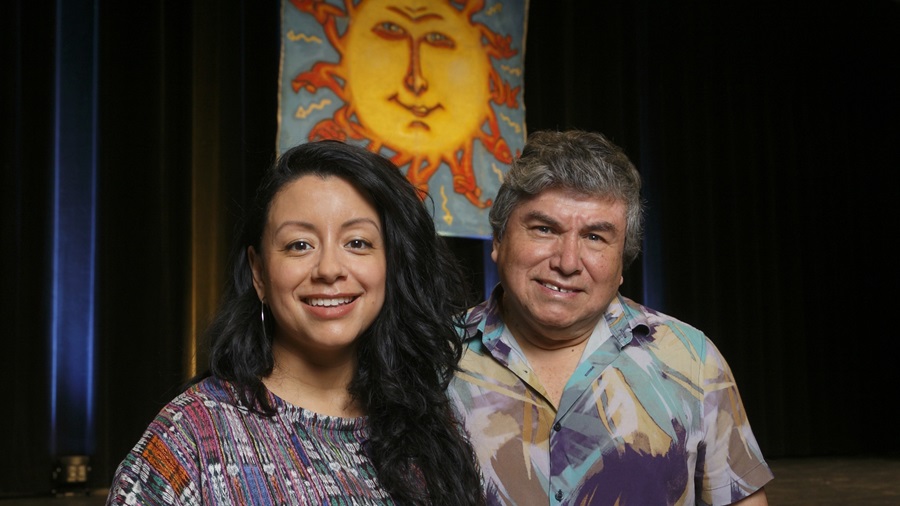 Photo: Alfredo Caxaj with daughter and Sunfest co-artistic director Mercedes Caxaj
Photo: Alfredo Caxaj with daughter and Sunfest co-artistic director Mercedes Caxaj
Sunfest, the beloved summer music festival that will celebrate its 30th year this year, began as something more modest: the Between Cultures Arts Dialogue concert series. A professional percussionist, Caxaj wanted to introduce top-notch musicians from around the world to London. He thought of the concept as, “a social project,” a label he still uses to describe Sunfest.
After staging a handful of concerts, he and his wife, Paty, were itching to try something bigger. Their first effort to launch Sunfest, in 1994, failed for lack of financing. It was a signal that funding would be an ongoing challenge for a festival that has always been free to attend. By 1995, the family and a small group of volunteers pulled together enough money not only to stage a festival but also to commission an original piece of art to serve as its logo.
“It’s very significant to me,” Caxaj says of his Order of Canada appointment. “I see it as recognition of everyone who has come to Canada as refugees and contributed to their new country”
They put out a call for submissions and chose from among scores of submissions, eventually selecting a sun image from an Aboriginal artist. “We paid the artist $500,” Caxaj recalls. “No one knew we would use it for the next 30 years.”
Local jazz artist Oliver Whitehead was on the original organizing committee. “He has the minutes of our first meeting,” Caxaj says.
The festival was in Victoria Park, setting a precedent that remains, over a three-day weekend in July. “It rained for one-and-a-half of those days, but people absolutely loved it,” he recalls fondly. “We drew about 3,000 or 4,000 people.”
Story Continues Below
Enthralled by what her parents had created, Mercedes, then eight years old, spent most of the weekend with a cardboard box, asking people for donations. She and her brother, Alfie, have never missed a festival, whether living in London or abroad over the last three decades. She is now co-artist director of the festival and fall-to-spring concert series.
Watching his audacious vision spring to life, Caxaj couldn’t help but think back to a decade prior — the day he, Paty and Alfie touched down in Toronto and were escorted to a bus for London. They had left behind their extended family and roiling political violence that would keep them from going back to visit for the next 14 years.
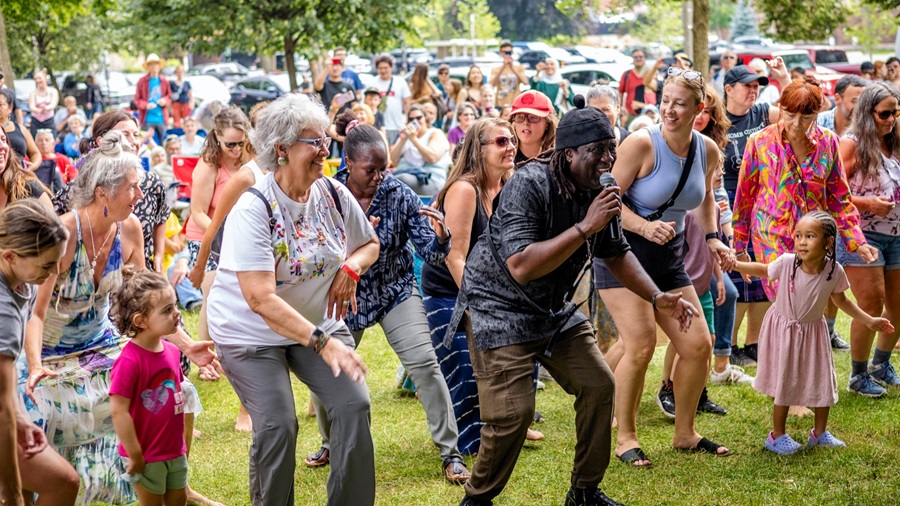
“It was cold,” he recalls, wistfully. “They gave us boots and coats; as we were driving, we looked out the windows. ‘Where are the mountains?’ We didn’t know a lot about Canada, or London of course.”
They quickly saw two sides of the society they were joining. Helpful officials and volunteers helped them get set up with an apartment and necessities. They had vouchers to buy anything they needed at downtown Zeller’s.
“They said we could choose what we wanted,” Caxaj recalls. “Really? We can just buy what we need? They said yes. I was looking at a leather coat, but the woman working there told me I should choose something else, something cheaper. I really liked the coat, but she insisted the other one was better for me. The one I liked was too nice for an immigrant. It was obvious she thought the cheaper one was right for us. My English wasn’t good then, but it was clear what was happening.”
Story Continues Below
The family’s first five years were peppered with struggles of all kinds. Their professional training as teachers in Guatemala was of no use. Paty studied hard at college and later secured some casual science and technology teaching positions. Caxaj spent three years working midnights at Canada Post, sorting mail. It was steady work, but the hours made family life difficult. His love of music remained, but that was hard to remember at times, slogging to the mail depot for his overnight shift.
Launching the festival was a turning point for the family, the extent to which they could not have even guessed that weekend in 1995. Their vision was to bring professional musicians from around the world, to stage a festival that would rival, in quality if not in size, anything happening in Toronto or beyond. To do that, they had to build a network of musicians and festival organizers, working year-round to identify groups and arrange for them to travel the globe to be in London in early July. Combined, father and daughter now make 15 to 20 trips every year to meet musicians and festival organizers. “We’re going to scout musicians and talk to people running festivals all over the world,” Mercedes says.
Living in France in 2009, she joined her father for the first time at an international conference. To be fair, Copenhagen was an enticing draw all on its own. She’d always been active in Sunfest, coming home every July, but that experience turned her head to some degree. It wasn’t long before she moved back and became co-artistic director.
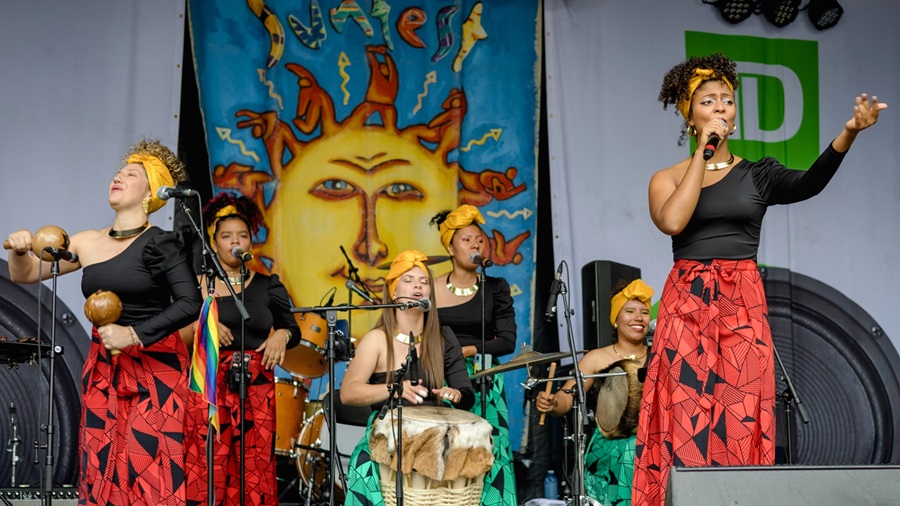
Every year, a version of the same thing happens: The family hears from an excited festival goer who simply cannot believe a given band has come to London. The band has superstar status in the person’s home country, so they know full well how amazing it is to see them at Sunfest.
After the first decade or so, Caxaj was able to turn his hobby into something from which he could make a living. Sunfest is a registered charity, and no one is getting rich. But professionalizing the organization was the next big step in the festival’s growth. In 2004, the festival got its first ever title sponsor: Western Union. When it bowed out after a couple of years, TD Canada Trust stepped in. The festival’s official name is TD Sunfest, although the funding agreements are never for more than a year. Each year, the festival must make its case to TD and wait for official confirmation. In late January, Caxaj was still waiting to hear about 2024.
Story Continues Below
But his case is stronger than ever. With a budget these days of roughly $750,000, the festival has never been bigger. A Sport Tourism Canada study last year linked $6 million in economic impact to the event — an event Caxaj goes out his way to remind anyone listening, “is still free to attend.”
One of Mercedes’ jobs is attracting and coordinating the 250 vendors who participate every year. Add to that more than 500 volunteers and you have an organizational challenge exceeding anything imaginable in the nascent years of the festival.
One highlight among many over the three decades was 2019 when Prime Minister Trudeau attended the festival and met with the Caxaj family. “That was huge for us and for the festival. The news of him being here went around the world,” he says.
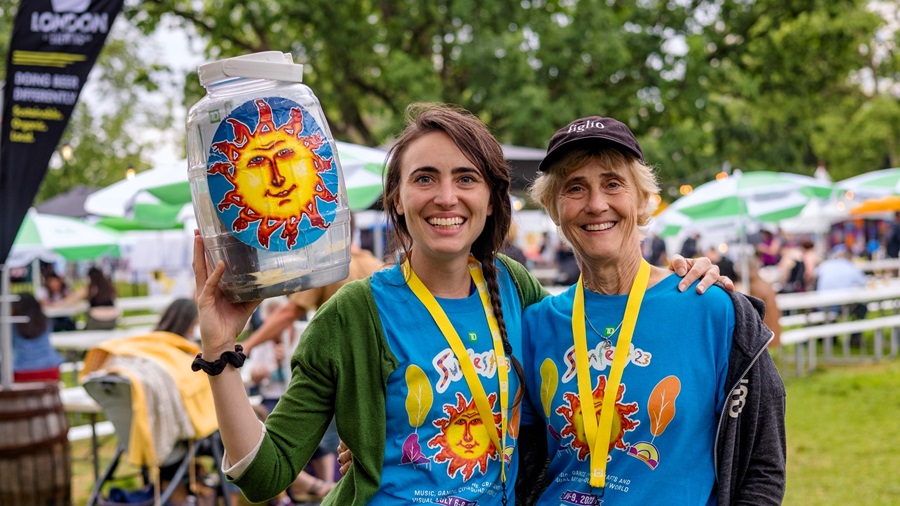
Receiving news of his Order of Canada appointment was nearly as exciting. “It’s very significant to me,” he says. “I see it as recognition of everyone who has come to Canada as refugees and contributed to their new country.”
There is no date yet for the Ottawa ceremony, although Caxaj has received his snowflake lapel pin, emblematic of being in the Order. His 2024 calendar is open for a trip to Ottawa, with one very large exception. The 30th Sunfest is July 4 to 7, and no award will pull him away from Victoria Park. He, his family and crowds in the thousands will gather to marvel at talent from around the globe and celebrate an event that demonstrates the power of music, arts and cultural diversity — an event that traces its origin to a cold November day nearly four decades ago. ![]() Christopher Clark
Christopher Clark

